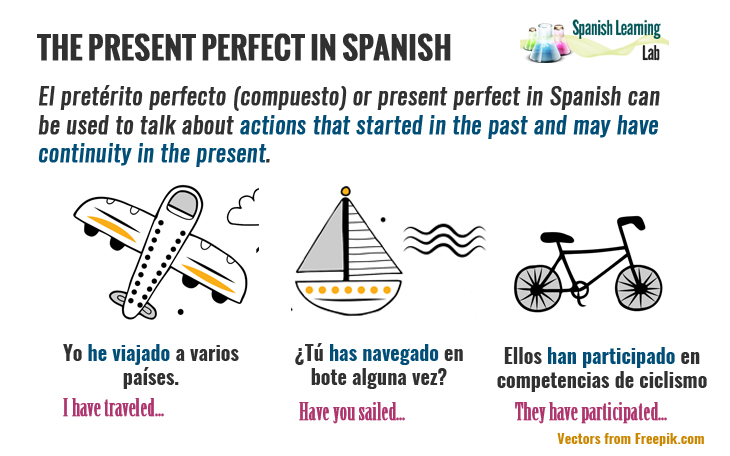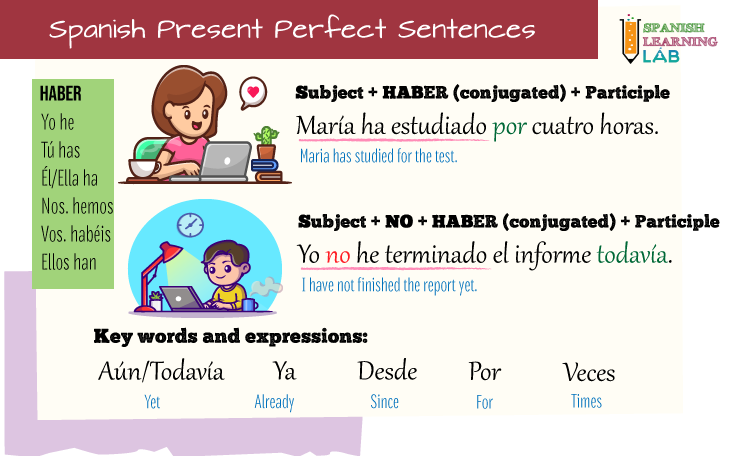Hello! Welcome to a new grammar lesson. In this lesson, we will learn the grammar rules to form sentences in the present perfect in Spanish and talk about things like life experiences or activities that we have done at some point in our lives. This lesson includes many interesting examples, and it will give you the chance to practice with the exercises in an interactive quiz. Let’s start…
What is the present perfect in Spanish?
The Royal Spanish Academy defines the present perfect in Spanish or “pretérito perfecto/pretérito perfecto compuesto”, the following way:
m. Gram. A tense that places the action, process or state expressed by the verb at a time before the present in an unfinished time. The form “He cantado” (I have sung) corresponds to the present perfect in Spanish.
In simple terms, “el pretérito perfecto compuesto” or present perfect in Spanish will be used to talk about actions that started in the past and may still have continuity in the present, for example, life experiences or specific actions that we have carried out in a given period of time, e.g. things we have done during this year. This grammatical tense corresponds to the present perfect of the English language, and we will essentially use it the same way.

The structure for the present perfect in Spanish
First, let’s take some time to compare the present perfect in Spanish with its counterpart in English. To form the present perfect in English, it is necessary to use the verb “To have” + “the Past participle“, for example: “I have eaten” or “She has traveled…“. In Spanish, we must also use the equivalent of the verb “to have”, in this case the verb “HABER” instead of the verb “TENER” (to have), plus the past participle in Spanish of the verb we need. The verb “HABER” is irregular, so we must be careful with its conjugation. Next, we show you the structure that we follow to form sentences in this tense:
| Sujeto | HABER | Participio |
| Yo | he | escuchado |
| Tú/Vos | has | escuchado |
| El/Ella/Usted | ha | escuchado |
| Nosotros | hemos | escuchado |
| Vosotros | habéis | escuchado |
| Ellos/Ustedes | han | escuchado |
As you can see in the previous table, we only need to conjugate the verb HABER appropriately depending on the subject of the sentence. The verb in participle, in this case “ESCUCHADO” (listened), will remain the same for all personal pronouns. Keep in mind that knowing how to conjugate verbs in the Spanish participle tense is essential for sentences to have a proper structure in this tense.
How to form sentences in the present perfect in Spanish
Sentences with the perfect tense in Spanish are not that complex. Just like in the English language, it is common to use words such as “POR” (for), “DESDE” (since), YA (already), TODAVÍA (yet) to complement the sentences in Spanish. The words “YA” and “TODAVÍA” are often used at the beginning or at the end of sentences, for example: “Ya he visto la película” (I have already watched the movie) or “Todavía no hemos cenado” (We have not had dinner yet). As for negative sentences, you just need to add the word “NO” before the right conjugation of “HABER”. Check the two examples in the picture below:

As a cultural note, keep in mind that “el pretérito perfecto” is not used as frequently used in Latin America as it is in Spain. Of course, we understand it completely and use it a bit often, but we do use the past tense instead more often. For example, in Spain people will often use the “pretérito perfecto” to talk about lots of different things, e.g. “Ya he escuchado esa canción” (I’ve already heard that song) or “Te he contado la historia varias veces” (I have told you the story several times). On the other hand, in Mexico you will probably hear more sentences with the past tense like “Ya escuché esa canción” (I already heard that song) or “Te conté la historia varias veces” (I told you the story several times). Both forms are easily understood, and the one you use will depend on the context and the message you want to convey.
Pay attention to the next group of sentences using the present perfect in Spanish. Compare the sentences with their translation in English and try to identify the main differences and similarities.
|
Yo he mirado las noticias.
I have watched the news.
|
|
He vivido en California por 10 años.
I have lived in California for 10 years.
|
|
¿Tú has visitado Puerto Rico alguna vez?
Have you ever visited Puerto Rico?
|
|
¡Has cometido un grave error!
You have made a serious mistake!
|
|
¿Sabes si ella ya ha terminado de llenar el formulario?
Do you know if she has finished filling out the form?
|
|
Él ha escrito poesía desde que tenía 8 años.
He has written poetry since he was 8 years old.
|
|
¿Usted ha visto a mi perrito?
Have you seen my puppy?
|
|
Nosotros hemos olvidado lo que el maestro dijo.
We have forgotten what the teacher said.
|
|
Vosotros habéis dicho que el evento fue cancelado.
You have said that the event was canceled.
|
|
Los estudiantes han anunciado que saldrán a protestar.
The students have announced that they will come out to protest.
|
|
¿Ustedes han terminado el proyecto de ciencias?
Have you finished the science project?
|
As you can see in the previous examples, what matters for this tense is to conjugate the verb HABER properly, as well as verbs in the past participle that have an irregular form in Spanish like VER -> Visto(seen) and DECIR -> Dicho (said). With that said, it is time to practice what we have explained throughout the lesson with some interesting exercises in an interactive quiz.
Interactive quiz
Related Spanish Worksheets:
- The Verb HABER in Spanish (Sentences)
- Spanish Present Perfect Tense
- The Past Participle in Spanish
- The Past Perfect in Spanish
- Let’s talk about Health in Spanish – Conversation cards
- Let’s talk about Travel in Spanish – Conversation cards
- Life experiences in Spanish – Conversation cards
